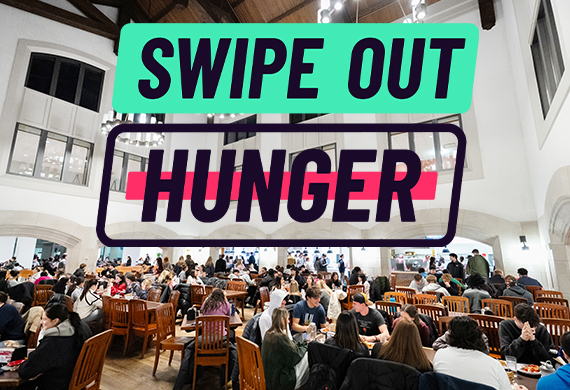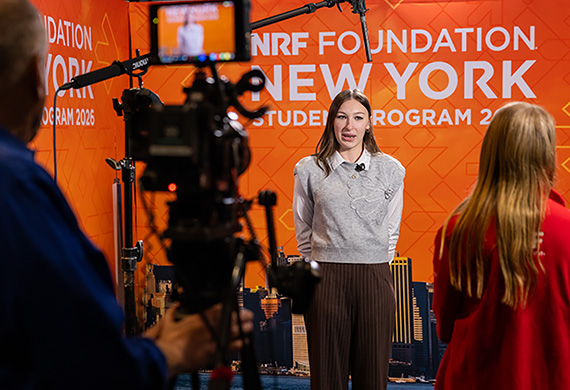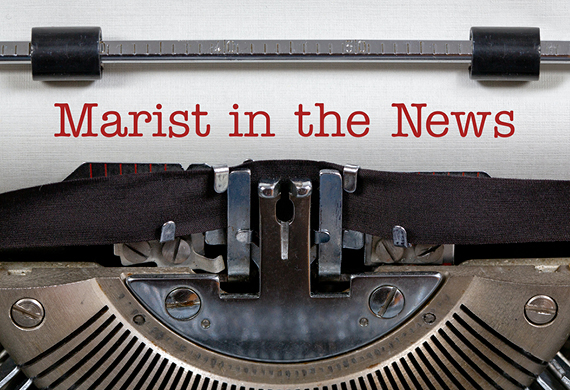Writing Through the Pandemic

Kaleigh Garraffa ’21 used her downtime in 2020 to write a novel—drawing inspiration from a Marist course.
February 19, 2021—Some people used the unusual circumstances of 2020 to perfect making sourdough bread. Some have taken up new hobbies to fill the time formerly occupied by outings and travel. Marist senior Kaleigh Garraffa decided to use the time to push herself to achieve a longstanding goal: she wrote a novel.
An avid reader since childhood, Garraffa rediscovered her passion for writing at Marist. She has taken numerous writing courses with Associate Professor Lea Graham and Associate Professor Tommy Zurhellen. Garraffa grew up in Woodstock, New York, and is a double major in communication and Spanish with a minor in creative writing.
“When in-person classes ended last March because of COVID, I was so sad,” Garraffa said. “Although I knew that my struggle with the pandemic was minuscule compared to the tragic circumstances occurring each day, I couldn’t help but ponder how every individual was struggling with the pandemic in their own way, and what I could do to help. Everyone has a talent and passion to contribute to the world: their very own light to shine on others when things get dark. Mine happens to be writing.”
Garraffa learned about Creator Institute, a program developed by Georgetown University Professor Eric Koester to help aspiring writers. The program gave her the push she needed and she decided to use her “pandemic downtime” to write a novel. “Beginning in May, I started working with Koester, various editors, mentors from Creator Institute, as well as other authors in the program to make this dream of mine a reality,” Garraffa explained. “The program consists of weekly Zoom calls with the Creator Institute team to break down each step of the process, as well as to collaborate with other authors via writing workshops.”
Always a fan of the mystery genre, Garraffa knew she wanted to pen her own thriller. Being of Dominican descent, she wanted a Latin American focus as well.
“At some point, it just hit me,” she recalled. “I knew I wanted the backdrop of my book to be the Dirty War in Argentina.”
The Dirty War occurred 1976-83, and Garraffa learned about it in Professor Ivette Romero’s course, “Women in Latin American Film,” through the film, La historia oficial (The Official Story). During the Dirty War, military and right-wing death squads hunted political dissidents. During this time, many pregnant women were kidnapped and murdered after their babies were born. The government would give the babies to families deemed “friendly” to the regime. For years after the Dirty War, mothers of the missing women attempted to locate their grandchildren. These women were dubbed “la locas” (the madwomen); they protested for over 30 years. Over this period, there were 130 grandchildren reunited with their grandmothers.
Using this history as a jumping off point, Garraffa’s novel, Las Locas, focuses on one such reunion. The story is told from three perspectives: a grandmother seeking her grandchild; a woman with an adopted child; and an adult woman trying to sort out her own difficult relationship with her mother and the suspicious circumstances around her death. She completed a draft in October.
Professor Romero feels a sense of pride about Garraffa’s project. “My first reaction on hearing the news of the novel she was writing was surprise and absolute delight,” Romero recalled. “It is interesting that what Kaleigh has been doing through the process of writing this novel is exactly what we expect of our graduating students. For example, for their Spanish Capping project, we expect them to demonstrate that they are able to incorporate skills from their academic trajectory and to apply them to a research project of their choice. In Kaleigh’s case, one can see that, in order to carry out further research for her novel, she understood and incorporated key points from other courses such as Cultures of Latin America, where they also examined the effects of Argentina’s civic-military dictatorship, while incorporating the multifarious skills she acquired through her majors and minor.”
Garraffa did much of her writing over the summer when life was especially quiet. “Once classes started up again in the fall, balancing finishing my manuscript with the workload of my classes became a bit challenging. To assure that I was both creating a book that my readers would love, as well as learning and succeeding to the maximum potential in my classes, I made a weekly schedule for myself to keep up with my daily tasks, while making sure to give myself room to rest, recharge, and de-stress,” she said.
After receiving notes and feedback from her editor, Garraffa is now working on revising and finalizing Las Locas with the goal of publishing it this spring. Overall, the project has been an immense growth experience for her. “It’s gratifying to set a big goal and then achieve it,” she said.
Following graduation this spring, Garraffa hopes to pursue a career in publishing.



